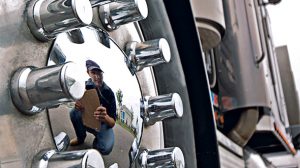Compliance is important, but it doesn’t ensure safety

Vehicle inspections ensure that the safety components of the vehicle are in good working order and meet the minimum requirements. Photo: iStock.com/shotbydave
Safety is something I typically say takes on different meanings depending on the person or the activity taking place.
First, let’s look at the definition of safety according to Merriam-Webster’s Dictionary. Safety is “the condition of being safe from undergoing or causing hurt, injury or loss.”
I also looked at the definition of compliance. According Merriam-Webster’s Dictionary, compliance is “the act or process of complying to a desire, demand, proposal, or regimen or to coercion.” So what does that mean to the propane industry? Does being compliant mean you are also being safe?
In my opinion, compliance takes on a couple of meanings. One meaning is being compliant with regulations such as those required by the Department of Transportation (DOT). When we typically think of DOT, we think of driver and vehicle compliance.
For example, ensuring commercial driver’s licenses are current and have the correct endorsements and that physical requirements are met might give the impression that a company or driver is safe. Drivers may meet the requirements of the regulation to drive, but that does not necessarily mean they are safe or have a good safety record. In order to have a license to drive, you must have the knowledge and physical attributes required by regulation, but your driving style is the action that you personally elect to do. The responsibility of driving safely is up to you.
Vehicle maintenance brings another meaning to compliance. We all strive to ensure vehicles are current with annual vehicle inspections – which are required by regulation – and to ensure the safety components of the vehicle are in good working order and meet the minimum requirements. Many items on vehicles require inspection and daily documentation, such as brakes, lights, mirrors, wipers, signs of leaks, etc.
These inspections are performed on mechanical items designed to ensure the safe operation of the vehicle, which is how you remain compliant with DOT requirements, but it is your responsibility to be sure the vehicle is safe to drive.
Depending on how the vehicle is equipped, there can be additional compliance requirements. The most common for the propane industry is the bobtail, where additional cargo tank inspections and testing of the barrel, bottle, container and pumping system are required. These include annual visual inspections, hydrostatic inspections, ensuring proper operation of safety devices, relief valves, isolation valves, flex connectors, hoses and many others.
We have another regulatory agency, the Pipeline and Hazardous Materials Safety Administration, which prescribes additional regulations to which the propane industry must adhere. These regulations prescribe inspections or testing to be performed that provides a level of safety, but does this mean the vehicle is safe and will continue to be? No – it means at the time of inspection the vehicle is compliant with the minimum regulations, but it is still your responsibility to ensure the vehicle is safe to operate.
There are many other areas in daily propane operations with regulatory requirements or codes and standards to which you must adhere. I would need to have the entire magazine devoted to this topic in order to touch on all of them. It is important to remember that although there may be many regulations with which to comply, you are responsible for operating in a safe manner that protects the public, your fellow employees and yourself.
Randy Warner is the owner of C3H8 Consulting LLC.
NOTE: The opinions and viewpoints expressed herein are solely the author’s and should in no way be interpreted as those of LP Gas magazine or any of its staff members.
















